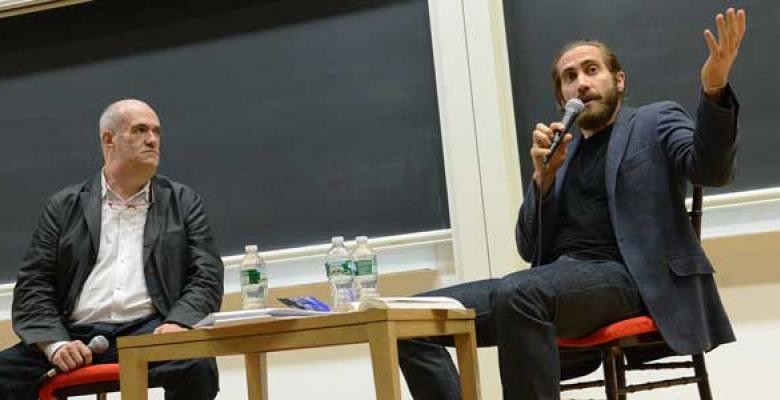The Year of James Baldwin Lands at Columbia

James Baldwin, the eminent novelist, essayist and social critic would have turned 90 this year. To celebrate and consider his enduring impact on society, Columbia’s School of the Arts joined with a consortium of cultural and educational organizations throughout New York City to co-sponsor a slate of panels, performances, readings, exhibitions and other programming.
The Year of James Baldwin came to campus on May 1 with an eclectic public conversation between Columbia professor and author Colm Toíbin and actor Jake Gyllenhaal aimed at providing fresh context to Baldwin’s legacy.
“He gave us our messy humanity in all of its vulnerability, fragility, destructive fearfulness and imaginative creativity,” said Farah Jasmine Griffin, the William B. Ransford Professor of English and Comparative Literature and African American Studies, who introduced the event. Baldwin “dared to suggest that the only way we will ever see each other fully is to reach beyond boundaries of race, gender, sexuality, region and nation,” she said.
As The New York Times recently reported in its coverage of the festival, once a staple of high school classrooms, Baldwin’s works are less frequently taught today. It was the urge to revitalize his legacy that provided the impetus for The Year of James Baldwin.
“He’s incendiary and has somehow been occluded from our national culture,” said Rich Blint, a Baldwin scholar and associate director of community outreach and education at the School of the Arts, whose cosponsors for Baldwin programming include Harlem Stage and New York Live Arts, a performance group directed by the dancer and choreographer Bill T. Jones.
Born in 1924 in Harlem, Baldwin grew up in poverty, the oldest of nine children. His childhood was marked by a troubled relationship with his preacher stepfather, but early on, he showed a literary flair. After graduating from high school, he left home for good, settling in bohemian Greenwich Village.
In 1948, he moved to Paris—a place he found more welcoming to a gay, black man—where he lived on and off until his death in 1987. Over the years he returned to America, becoming a leading spokesman for the Civil Rights Movement.
Through such books as his first novel, the 1953 semi-autobiographical Go Tell It on the Mountain, about a Harlem teenager’s search for meaning, and his searing race essays a decade later in The Fire Next Time, Baldwin became the moral voice of a generation.
“Here we are, two white guys talking about James Baldwin. We have to justify our presence,” said Toíbin, the Irene and Sidney B. Silverman Professor of English and Comparative Literature, during the conversation with Gyllenhaal.
“I was brought up in a very Catholic society in Ireland, and after reading his second novel, Giovanni’s Room,I discovered—hold on, this guy’s gay. And, of course, I’m gay, and I had thought I was the only guy who was like this.”
Gyllenhaal, who read passages from Baldwin’s third novel, Another Country, talked about how the 1962 best seller, which touches on interracial sex, bisexuality and suicide, highlights how “we are bowled over by convention every single day and look for it to define us.”
In Toibin’s words, the novel is “about how to become an adult.” As part of the year of Baldwin, New York Live Arts hosted “James Baldwin, This Time,” a five-day series of events in April featuring playwright Suzan-Lori Parks, artist Carrie Mae Weems, poet Nikky Finney, actress Kathleen Chalfant and writers Jamaica Kincaid and Lawrence Weschler, among others.
More events are planned at Columbia and elsewhere this summer, culminating on Aug. 2—Baldwin’s birthday—when a section of 128th Street between Fifth and Madison avenues will be named after him.
The block is home to Harlem Renaissance High School, formerly P.S. 24, where Baldwin attended elementary school. Baldwin would have been 84 in 2008, when Barack Obama was elected president, and Toíbin regretted that he didn’t live long enough to witness and write about events of recent years, such as that historic election, 9/11, and Abu Ghraib because, as Toíbin noted, Baldwin’s ideas and writing “are still utterly relevant.”